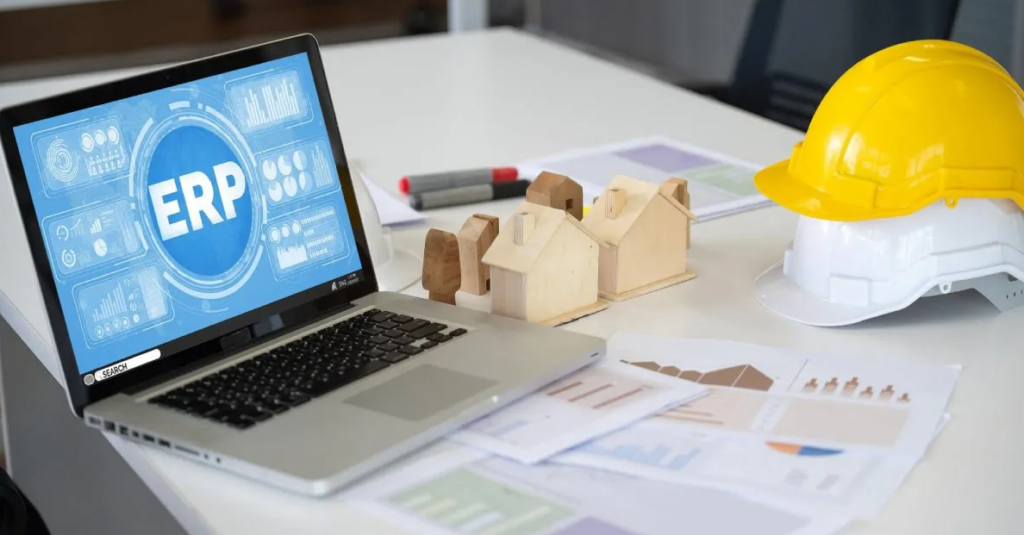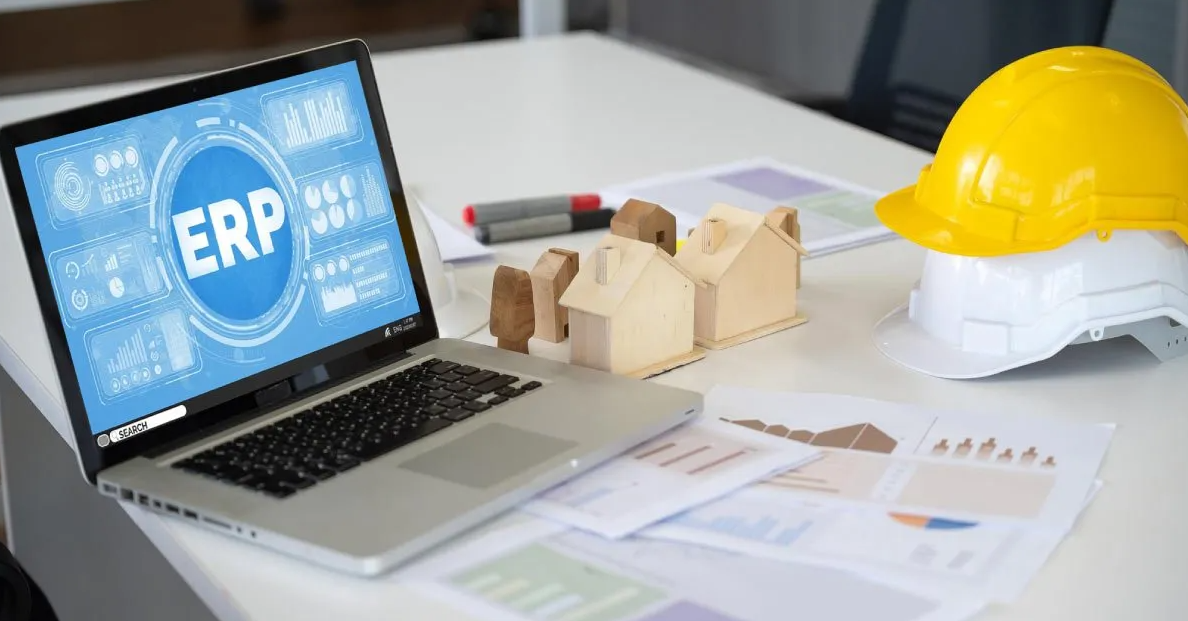The construction industry, with its myriad of operations and intricate processes, demands a robust system to manage projects efficiently. In this digital age, Construction Enterprise Resource Planning (ERP) has emerged as a vital tool for enhancing productivity, improving communication, and optimizing resource allocation.
Introduction to Construction ERP

Construction ERP essentially integrates various aspects of project management, financial tracking, resource allocation, and communication onto a single platform. This centralized system ensures seamless coordination among different departments and stakeholders involved in construction projects, from inception to completion.
In the competitive landscape of construction, the ability to manage projects effectively while ensuring profitability is crucial. ERP systems tailored for the construction industry bring together functionalities that are specifically designed to meet these needs.
Key Features of Construction ERP
Integration of Project Management
One of the core features of Construction ERP is its ability to streamline project management processes. It allows for the seamless coordination of tasks, schedules, and resources, thereby minimizing delays and enhancing overall project efficiency.
Financial Management and Accounting
Construction ERP provides robust financial management tools, enabling accurate tracking of project expenses, budget allocation, invoicing, and cash flow management. This helps in maintaining financial health and adherence to budgets.
Resource Planning and Scheduling
Efficient allocation of resources such as manpower, equipment, and materials is made possible through Construction ERP. Advanced scheduling features ensure optimal resource utilization, reducing wastage and delays.
Document Management and Collaboration
Centralized document storage and real-time collaboration features facilitate smooth communication among team members, architects, engineers, and other stakeholders. This ensures that everyone works on the most updated information, reducing errors and misunderstandings.
Benefits of Using Construction ERP
The adoption of Construction ERP brings forth a multitude of benefits for construction firms:
Enhanced Project Efficiency
By streamlining processes and providing real-time data insights, ERP systems significantly enhance project efficiency. Tasks are completed on time, reducing project durations and increasing overall productivity.
Improved Cost Control and Budget Management
Construction ERP enables accurate tracking of project expenses, helping in better budget planning and control. It minimizes cost overruns by identifying potential risks and deviations from the planned budget.
Real-Time Insights and Reporting
The availability of real-time data and analytics empowers decision-makers with crucial information. This helps in making informed decisions promptly, contributing to better project outcomes.
Streamlined Communication and Collaboration
ERP systems foster improved communication and collaboration among project stakeholders, irrespective of their physical location. This ensures that all team members are on the same page, leading to smoother project execution.
Challenges in Implementing Construction ERP
However, implementing Construction ERP comes with its set of challenges:
Resistance to Change
Introducing new technology often faces resistance from employees accustomed to traditional methods. Change management strategies are crucial to overcome this challenge.
Complexity in System Integration
Integrating various departments, legacy systems, and new ERP solutions can be complex and time-consuming. Proper planning and phased implementation can address this issue.
Data Security Concerns
Given the sensitive nature of construction data, ensuring robust security measures within ERP systems is paramount. Data breaches can lead to significant setbacks and loss of trust.
Best Practices for Successful Implementation
To ensure a successful implementation of Construction ERP, several best practices should be considered:
Employee Training and Engagement
Comprehensive training programs and engaging employees in the implementation process can facilitate smoother adoption of the new system.
Customization to Suit Specific Needs
Tailoring the ERP system to the unique requirements of the construction firm ensures maximum efficiency and usability.
Continuous Evaluation and Updates
Regular evaluation and updates to the ERP system are essential to keep it aligned with changing business needs and technological advancements.
Future Trends in Construction ERP
Looking ahead, several trends are shaping the future of Construction ERP:
Advancements in Technology
Continuous advancements in technology, such as AI and machine learning, are revolutionizing ERP systems, making them more intuitive and efficient.
AI and Automation in ERP Systems
Integration of AI and automation is enhancing predictive analytics, optimizing resource allocation, and automating routine tasks in ERP systems.
Cloud-Based Solutions and Mobility
The shift towards cloud-based ERP solutions offers increased accessibility, scalability, and mobility, allowing for remote project management and real-time updates.
Case Studies on Successful Construction ERP Implementation
Several companies have witnessed remarkable improvements after implementing Construction ERP:
Examples of Companies Benefiting from ERP
Company A: Increased project completion rates by 20% within the first year of ERP implementation. Company B: Achieved 30% cost savings through better resource utilization and budget control.
Comparison of Construction ERP Solutions
Various ERP software available in the market cater to the specific needs of construction firms:
Different ERP Software Available
- ERP Solution X: Known for its robust project management features.
- ERP Solution Y: Specializes in financial management and reporting.
Pros and Cons of Each Solution
ERP Solution X: Offers comprehensive project tracking but may have a steeper learning curve. ERP Solution Y: User-friendly interface but lacks certain advanced project management functionalities.
Selecting the Right Construction ERP for Your Business
Choosing the right ERP for a construction business involves considering several factors:
Factors to Consider in Choosing ERP
- Scalability
- Customization options
- User interface and ease of use
Tailoring ERP Selection to Business Needs
Aligning the chosen ERP with specific business goals and requirements is crucial for maximizing its benefits.
Cost Considerations and ROI of Construction ERP
While the initial investment in Construction ERP might seem significant, the long-term benefits often outweigh the costs:
Initial Investment vs. Long-Term Benefits
Despite the upfront costs, the efficiency gains, cost savings, and improved project outcomes result in a high return on investment.
Calculating Return on Investment
Measuring the ROI involves analyzing the reduction in project timelines, cost savings, and improved resource allocation attributed to ERP implementation.
Security and Data Protection in Construction ERP
Ensuring robust security measures within ERP systems is imperative:
Ensuring Data Security Measures
Implementing encryption, access controls, and regular security audits mitigate the risk of data breaches.
Compliance with Industry Standards
Adhering to industry standards and regulations ensures data protection and builds trust with stakeholders.
The Role of Mobile Applications in Construction ERP
Mobile ERP solutions are gaining prominence due to their convenience and accessibility:
Benefits of Mobile ERP Solutions
Enabling remote access, real-time updates, and on-the-go project management enhances efficiency and productivity.
Accessibility and Remote Project Management
Mobile applications allow construction professionals to manage projects from anywhere, facilitating better coordination and decision-making.
Scaling ERP for Large and Small Construction Firms
The scalability of ERP systems poses both challenges and opportunities:
Challenges and Strategies for Scalability
Adapting ERP systems to accommodate the growth of large firms and the specific needs of smaller firms requires strategic planning.
Adapting ERP Systems for Different Company Sizes
Tailoring ERP solutions to suit the scale of operations ensures optimized performance and usability.
Sustainability Integration in Construction ERP
ERP systems play a role in promoting sustainable construction practices:
Using ERP for Sustainable Construction Practices
Monitoring and managing environmental impact through ERP aids in adopting eco-friendly construction methods.
Monitoring Environmental Impact Through ERP
Tracking energy consumption, waste management, and material sourcing contribute to sustainable construction initiatives.
Conclusion
In conclusion, Construction ERP stands as a transformative tool for the construction industry, offering streamlined project management, enhanced efficiency, and improved communication. Despite the challenges in implementation, the long-term benefits make it a worthwhile investment for construction firms looking to thrive in a competitive landscape.
Frequently Asked Questions (FAQs)
1. How does Construction ERP differ from generic ERP systems?
Construction ERP is tailored specifically for the unique needs of the construction industry, integrating features like project management, resource allocation, and financial tracking.
2. Can small construction firms benefit from implementing ERP?
Yes, ERP solutions can be scaled and customized to suit the requirements of small construction firms, enhancing their efficiency and productivity.
3. Are there any risks associated with data security in Construction ERP?
While data security is a concern, implementing robust security measures and compliance with industry standards mitigate these risks significantly.
4. How long does it take to see the benefits of implementing Construction ERP?
The timeframe for experiencing benefits varies but typically, improvements in efficiency and cost control can be observed within the initial stages of implementation.
5. What role does mobile technology play in Construction ERP?
Mobile ERP solutions enable remote project management, real-time updates, and accessibility, fostering better coordination and decision-making.
